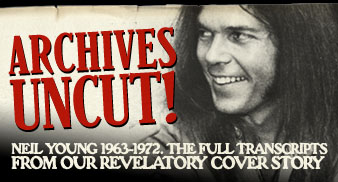GRAHAM NASH The silver-tonsilled Blackpool native who left The Hollies to join CSN, later CSNY. *** UNCUT: When did you first meet Neil? NASH: I met him in New York City in Bleeker Street, in the Village. That would have been early 1969. We had done the first CSN record. It had been out and obvi...
GRAHAM NASH
The silver-tonsilled Blackpool native who left The Hollies to join CSN, later CSNY.
***
UNCUT: When did you first meet Neil?
NASH: I met him in New York City in Bleeker Street, in the Village. That would have been early 1969. We had done the first CSN record. It had been out and obviously it had been very successful. And then we realised that we would have to go out on the road, and Stephen [Stills] wanted to play with somebody else in the band. David [Crosby] and I are decent enough rhythm guitar players, but we’re not lead guitar players like Stephen was. And he had had a history, in Buffalo Springfield, of playing lead guitar parts off Neil. And so it was decided to ask Neil to join. But I wouldn’t entertain the idea before I met him. I wanted to know who he was. Obviously I knew who he was, as an artist – obviously he was Neil Young, even then – and I’d heard “Expecting To Fly” from the Buffalo Springfield, and I thought it was absolutely fantastic. I was very much a fan of Buffalo Springfield, I thought they were fantastic. So I said, let me go to breakfast with Neil and I’ll make the decision after breakfast. And, of course, after we’d finished breakfast, I’d have made him prime minister of Canada! He was very funny, very droll, very dry sense of humour and I liked him immediately.
How did you find Neil worked in the studio? Did he come in with fully-formed ideas, or was he open to input and suggestions from other people?
On the Déjà vu album, Neil’s music was made on Neil’s ranch down just south of San Francisco. He would make the tracks, he would bring them and we would sing our parts on it and then he’d take the parts back home and mix them. So it was kind of a separatist deal – and I think some of us were a bit annoyed about that at the time– but it worked. And what works is always the best thing to go with.
Can you describe was his relationship with Stills was like?
Again, in the studio, there was a special understanding when they played lead together. They always played off each other, sparked ideas. But, with us, Stephen concentrated more on vocals.
What do you remember of the “Helpless” sessions? This is more like a Neil solo song than CSNY.
Yes, it was. Neil kept waiting for us to slow down so he could sing it in the tempo that he wanted. Then some time about two, two-thirty in the morning we’d slowed down enough to catch up with Neil’s coma-paced speed, and then we cut Helpless. It is a tremendously slow song, and it has to be played together, as a unit, otherwise it just doesn’t hang together. But I think it’s a beautiful track.
The Déjà Vu sessions seemed pretty traumatic…
Yes, they ran the gamut of emotions, from thrilling to soul-destroying
You, Stills and Crosby had all split, or lost, partners.
Yeah, David’s girlfriend had been killed, I wasn’t with Joni, Stephen had split with Judy Collins. It was a sad time. But we did have some good music to make.
How did Neil respond to this?
Same way Neil always does, he gets on with the job in hand. He gets on with what we’re supposed to be doing. He’s a tremendously focused man. I appreciate that in him.
You once told UNCUT the Déjà vu sessions were “insanity” particularly the story of Neil¹s bush babies, Harriet and Speedy. What else do you remember about Neil from that period?
It was all crazy. We were staying by the Caravan Lodge Motel, just by the studio there at Wally Hyders (?) in San Francisco, and we all had our own rooms, and it was just fucking madness. You’d go and knock on Neil’s door and this thing would just jump across the room and you’d go, what the hell was that? And he’d say, “Oh man, these are my two bush babies, Harriet and Speedy. I was a bit lonely so I got two friends.” Drugs? Of course, are you kidding? There were so many drugs around that time it was insane. We thought it was creative then, but I haven’t snorted cocaine since 1984, not for about 25 years. At the time we thought it was good, but we were wrong. Cocaine never helps creativity. Marijuana is a much more creative drug than cocaine. But around those sessions I think we were on everything.
What did you think about his early run of solo albums?
Fantastic. I love his stuff. His work rate is prodigious but more importantly his strike rate was even better. There aren’t many duff tracks on any of his albums.
Has Neil changed over the years?
Well, how have we all changed? Let’s start with me, David and Stephen. We started out when we found that we had a certain sound and we made a couple of really fine records. And then you start to get comfortable with stardom and money and fame, etc, and then you come back to being normal. And that’s what I’ve always tried to do. You have to try and remain normal. Neil is very good at that. I think that’s what informs his workrate and his focus – he’s never let stardom get to him at all.
INTERVIEW: JOHN LEWIS



